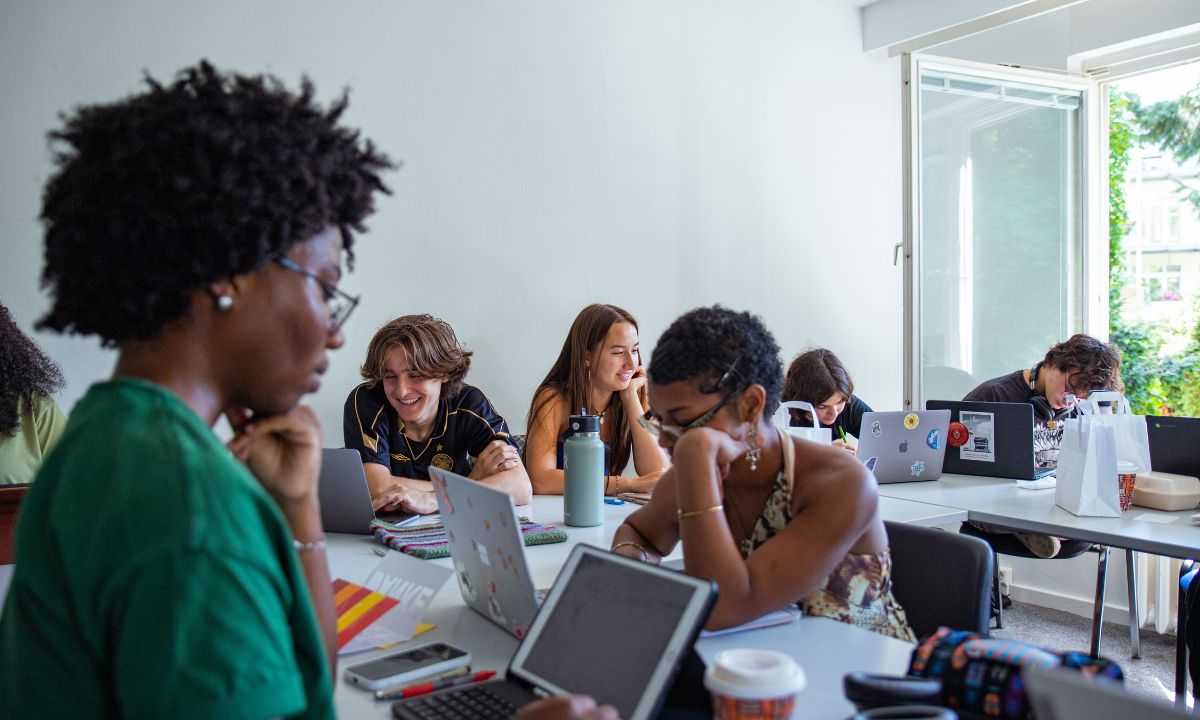Early College Offers Students More Than Just Higher Ed Credits
Blake: My school provides a place to think, rise to the occasion of college, and become a better human being.

Get stories like this delivered straight to your inbox. Sign up for The 74 Newsletter
As a queer, Black teenager from Baltimore, I had no idea that one of my favorite pieces of literature would be 200 years old, a book about a man and a “man,” whose story poses a question of what it is to be human: Mary Shelly’s “Frankenstein; or, The Modern Prometheus.”
This is the brilliance of the early college program, allowing all students access to the kind of free education everyone should have. My school, Bard High School Early College Baltimore, provides a place to think, rise to the occasion of college, and become a better human being.
My mother homeschooled me and my elder brothers through elementary and middle school. We couldn’t afford private school, but our parents did the best with the little they had. My mother would drive us around the greater Maryland area to take a variety of classes, exposing us to tons of different fields and building our interests in both STEM and the arts. I would not have had as strong an educational foundation if I had started out in the deeply flawed public school system.
When we reached high school, all three of us transferred into Bard, a four-year public school that offers two years of college coursework starting in junior year. In June, I will graduate with both a high school diploma and an associate’s degree.
At many schools, students have to pay for International Baccalaureate (IB) or for Advanced Placement (AP) exams to earn college credit. My program, one of 10 Bard Early College runs around the country, offers both challenging material and college credits all for no cost, so students are spending their time learning about new ideas and skills.
I have taken courses such as screenwriting, game development, and college physics to fulfill my AA credit requirements. However, “seminar” is the only class universal to early college scholars. I first encountered “Frankenstein” as a junior, considering the theme of justice in companion with Aristotle’s “Nicomachean Ethics.” This year, my professor introduced Jeffery Jerome Cohen’s “Monster Theory: Reading Culture,” a collection of essays, as a lens for analyzing “Frankenstein.” Differing insights bloomed from the separate readings: What is Victor’s responsibility to the Creature? How was Victor himself “monsterized?”
Furthermore, the early college program offers better preparation for the workforce. The National Center for Education Statistics’s Annual Earnings by Educational Attainment report shows that adults with a higher degree of education also have better paying jobs.
For seniors who choose the college route immediately after high school, the early college program is a head start. They are already acclimated to the culture and jargon of college: registering for classes, using professors’ office hours, and advocating for themselves.
For all early college students, transferable credits accelerate their post-secondary studies, saving money and allowing them to jump straight into more advanced courses of study. Because they have done two years’ worth of college-level work, these graduates will be more than ready to meet the demanding standards that colleges and universities are looking for.
The 2023 Bard Baltimore Impact Evaluation found that 84% of its graduates returned for a second year of college, either at the same or at a different post-secondary institution. In 2022, the retention rate for Baltimore City Public Schools graduates averaged 49%, according to the Maryland School Report Card.
Although monetary benefits have their place, my favorite aspect of the early college program is the emphasis on civic and intellectual engagement. Cultivating individuals with an innate sense of responsibility to their local and global community is far more critical than material success.
In my first year at Bard, I resolved to focus solely on academics. The diversity in perspectives within the curriculum partnered with the method of relating the “classics” to the contemporary time was refreshing. However, silently sitting in the same classes everyday was Sisyphean.
I only felt a sense of belonging when I started opening up to my teachers, who then helped me form relationships with my peers. For the duration of my time at Bard, I grew into a natural role as a teacher’s assistant and student mentor, realizing education was not just about satisfying curiosity, but about building relationships.
It only became meaningful when I shared and engaged with others’ ideas, leading me to want to pursue teaching as a way of repaying my local community. In a nutshell, the early college program is truly about understanding humans and improving the world.
A good education should be a right just by virtue of being human, not a privilege only afforded to some. The early college program makes this possible through its commitment to bringing college to high schoolers, preparing them for future success in their professional and personal lives. This is the path to creating a better, more illuminated, and empathetic society.
This article was published with the support of XQ Institute.
Get stories like these delivered straight to your inbox. Sign up for The 74 Newsletter

;)
